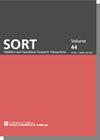纵向数据的贝叶斯结构前相关模型建议
IF 1.2
4区 数学
Q4 OPERATIONS RESEARCH & MANAGEMENT SCIENCE
Sort-Statistics and Operations Research Transactions
Pub Date : 2020-01-01
DOI:10.2436/20.8080.02.99
引用次数: 0
摘要
统计学中的一个重要问题是研究纵向数据,同时考虑到其他解释变量的影响,如治疗和时间,同时,将同一个体的观察结果之间的时间依赖性纳入模型。后者在非平稳相关和不同时间点的非恒定方差的情况下特别相关。前依赖性模型构成了一组众所周知的常用模型,可以适应这种行为。这些协方差模型可能包含太多参数,估计可能是一个复杂的优化问题,需要使用复杂的算法和编程。本文提出了一种新的贝叶斯方法,在前相关模型的背景下分析纵向数据。这种创新的方法考虑了具有非平稳相关性和方差的可能性,并为这类数据提出了一种鲁棒且计算效率高的估计方法。我们考虑了一般前相关模型的均值和协方差结构的联合建模,在纵向数据环境中估计它们的参数。我们的贝叶斯方法是基于Gibbs抽样和Metropolis-Hastings块算法的推广,适当地适应前依赖模型的纵向数据设置。最后,我们通过分析几个例子来说明所提出的方法,其中前依赖模型已被证明是有用的:小老鼠,语音识别和种族数据集。本文章由计算机程序翻译,如有差异,请以英文原文为准。
Bayesian structured antedependence model proposals for longitudinal data
An important problem in Statistics is the study of longitudinal data taking into account the effect of other explanatory variables, such as treatments and time and, simultaneously, the incorporation into the model of the time dependence between observations on the same individual. The latter is specially relevant in the case of nonstationary correlations, and nonconstant variances for the different time point at which measurements are taken. Antedependence models constitute a well known commonly used set of models that can accommodate this behaviour. These covariance models can include too many parameters and estimation can be a complicated optimization problem requiring the use of complex algorithms and programming. In this paper, a new Bayesian approach to analyse longitudinal data within the context of antedependence models is proposed. This innovative approach takes into account the possibility of having nonstationary correlations and variances, and proposes a robust and computationally efficient estimation method for this type of data. We consider the joint modelling of the mean and covariance structures for the general antedependence model, estimating their parameters in a longitudinal data context. Our Bayesian approach is based on a generalization of the Gibbs sampling and Metropolis-Hastings by blocks algorithm, properly adapted to the antedependence models longitudinal data settings. Finally, we illustrate the proposed methodology by analysing several examples where antedependence models have been shown to be useful: the small mice, the speech recognition and the race data sets.
求助全文
通过发布文献求助,成功后即可免费获取论文全文。
去求助
来源期刊

Sort-Statistics and Operations Research Transactions
管理科学-统计学与概率论
CiteScore
3.10
自引率
0.00%
发文量
0
审稿时长
>12 weeks
期刊介绍:
SORT (Statistics and Operations Research Transactions) —formerly Qüestiió— is an international journal launched in 2003. It is published twice-yearly, in English, by the Statistical Institute of Catalonia (Idescat). The journal is co-edited by the Universitat Politècnica de Catalunya, Universitat de Barcelona, Universitat Autonòma de Barcelona, Universitat de Girona, Universitat Pompeu Fabra i Universitat de Lleida, with the co-operation of the Spanish Section of the International Biometric Society and the Catalan Statistical Society. SORT promotes the publication of original articles of a methodological or applied nature or motivated by an applied problem in statistics, operations research, official statistics or biometrics as well as book reviews. We encourage authors to include an example of a real data set in their manuscripts.
 求助内容:
求助内容: 应助结果提醒方式:
应助结果提醒方式:


